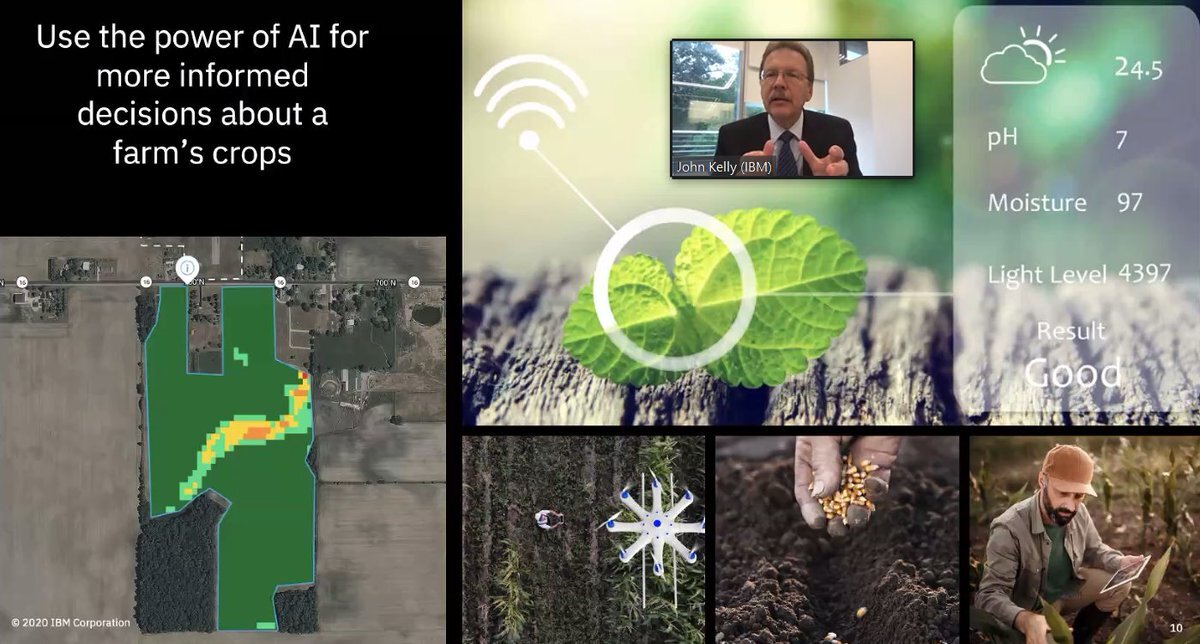Latest News
IBM Joins Effort by UN and Vatican to Use Ethical AI in Fight Against Hunger
The Vatican’s Pontifical Academy for Life, which began the year by urging the ethical development and application of artificial intelligence (AI), has announced an effort to use technology to...
The Vatican’s Pontifical Academy for Life, which began the year by urging the ethical development and application of artificial intelligence (AI), has announced an effort to use technology to fight world hunger, which has worsened during the pandemic.
The Vatican institution, in collaboration with IBM, Microsoft and the UN Food and Agriculture Organization, or FAO, is encouraging governments, nonprofits and corporations to assure that technology is used to feed everyone, and to make farmers’ lives more efficient and productive.
In its quest to assure the transparent, responsible and inclusive use of AI, the Vatican and FAO are pushing for solutions in agriculture that will benefit not just the well off, but also the poor.
“We need to face the biggest challenges on the planet,” said John E. Kelly III, executive vice president of IBM. “Food is a priority.”
Kelly, who participated in the FAO and Pontifical Academy’s Sept. 24 virtual conference announcing the effort against hunger, was one of the signers of the Vatican’s call for AI ethics in February.

IBM's John Kelly spoke at the UN-Vatican virtual conference on enlisting ethical AI in the fight against global hunger.
The Vatican's effort to promote ethical AI for social good includes a new program to use digital technology to ensure a more sustainable and efficient global food supply.
The benefits of AI in agriculture are potentially vast. The technology can be used to farm more sustainably, with less environmental damage; to forecast better; to avoid shortages and food crises; to generate insights that help farmers make decisions in real time rather than reacting when it’s too late; reduce food loss and waste; and provide better yields with less soil damage and erosion.
To avoid exacerbating the digital divide, the Pontifical Academy group said, countries must educate and train workers, and provide the capital, so that everyone can adopt digital technology. Done well, AI in agriculture could create new service jobs and attract young people to the sector.
Using AI, the group said, could give farmers greater insights about planning, plowing, planting, spraying and harvesting. With accurate data on weather, soil, equipment and workflow, farmers can farm more sustainably and increase yields.
The Role for Technology
The world’s food producers certainly need new tools. Climate change, with extreme weather, soil loss and spreading pest problems, has made agriculture more difficult. And the spread of COVID-19 has led to problems with food production and distribution, even as more people are poor because of the damage to the global economy.
For instance, drones and AI can give a visual assessment of pest and disease damage at the field level. That helps farmers know exactly when and where to spray pesticides, which are one of their biggest expenses.
With weather data, farmers could build better irrigation systems that would be more sensitive to changes in weather and not water unnecessarily.
Traditionally, farmers have used expensive, time-consuming chemical analysis to test the quality of their soil. IBM’s AgroPad is a smartphone app and paper-based soil test that uses sensors and AI algorithms to obtain on-the-spot analysis and instant information. This lets farmers irrigate only the plants that need water, saving not only money but important global resources.

Archbishop Vincenzo Paglia, president of the Pontifical Academy for Life, at left,
signing the Rome Call for AI Ethics with IBM's John E. Kelly III, in February 2020.
How AI, Quantum and Blockchain Can Help
Someday, the current types of industrially produced fertilizers may not be necessary at all. Using the accelerated discovery cycle made possible by AI and quantum computers, researchers are at work to better understand what catalyst might be developed to replicate nature's ability to convert nitrogen in the soil into nitrate-rich fertilizer. That would save money and reduce the negative environmental impact of today’s chemical fertilizers, whose production requires burning the equivalent of a ton of fossil fuels for every ton of fertilizer it yields.
What is more, about 1.3 billion tons of food are wasted globally each year. A technology that can help is IBM Food Trust, a blockchain-enabled data-sharing platform that connects participants across the food supply through a permissioned, permanent and shared record of food system data.
That can help cut down on waste and supply chain problems by, for instance, determining the best route to transport food safely and effectively, cutting down on spoilage. Data sharing through blockchain could help store, track and control inventory, so there would be fewer of the broken links we have seen during the coronavirus pandemic.
Countries must make digital technology affordable, the group said. When farmers can buy or rent technology, they can work more efficiently. In Africa and Asia, farmers of small plots can use smartphone apps like Hello Tractor to rent expensive agricultural equipment only for the time they use it.
The ability to respond optimally to weather conditions is critical for farming. By merging analytical insights from IBM's Watson Studio, IBM PAIRS technology, The Weather Company and other services, a coffee farmer in, say, Columbia, could act quickly to save a crop.
In the time of climate change, farming is becoming even more complex. But humans are remarkably adept at agriculture. Currently, the world produces enough food for everyone on the planet. The problem is access, availability and food waste—all problems that can be addressed through AI, smartly and humanely delivered.
“Traditional approaches to agriculture will not meet the surging demand for food,” Kelly said. “That’s a frightening scenario that requires new ways to boost smart crop production, to enable smart and secure supply chains, and to build resilient supply chains in times of natural disasters."